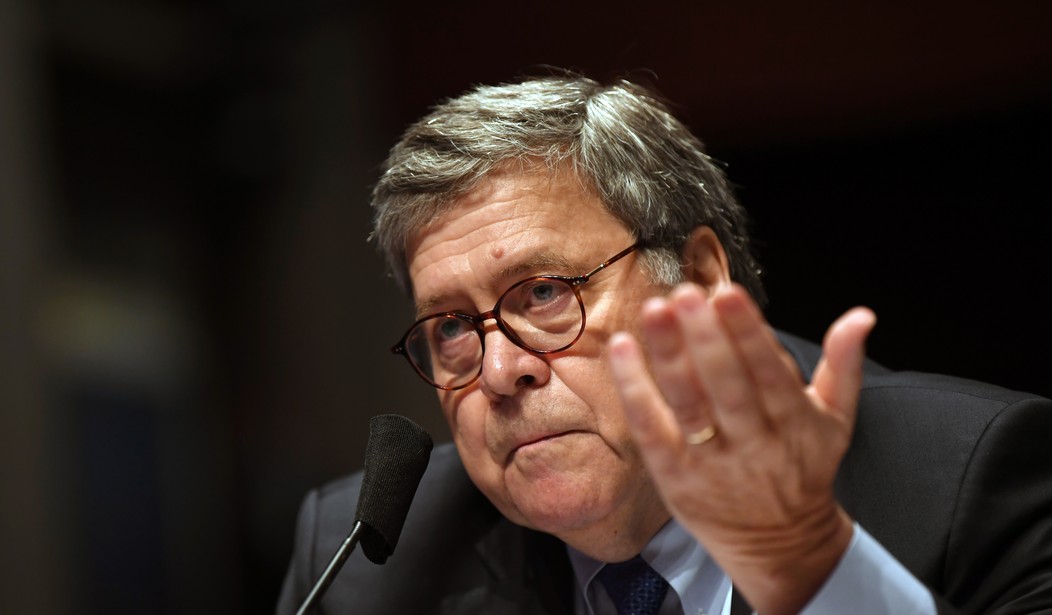After a scathing ruling from Judge Amy Berman Jackson, critics of Donald Trump and William Barr expected a smoking gun from this internal Department of Justice memo. Instead, it looks like a dud — another in a series involving the Russia-collusion hypothesis and subsequent special-counsel probe.
Jackson accused Barr of being “disingenuous” about the advice he received from the Office of Legal Counsel on prosecuting Trump for obstruction of justice, a question Robert Mueller pointedly left open for Barr:
Earlier this month, U.S. District Judge Amy Berman Jackson issued a scathing opinion saying that she had read the memo and that it showed that Barr was disingenuous when he cited the document as key to his conclusion that Trump had not broken the law.
She also accused department lawyers of misleading her about the internal discussions that surrounded the memo and ordered the memo be released, though she gave the government several weeks to decide whether to appeal.
The DoJ admitted that they hadn’t characterized the discussions very well in an appeal to keep the memo under seal. Apparently that didn’t work, as the DoJ ended up releasing part of the memo, which the Washington Post reviewed last night — and predicted would be “frustrating” to critics of Barr and Trump. In the body of the memo, OLC attorneys make clear reference to continuing consultations with Barr on the issue of prosecution of presidents, among other points of law. That is what angered Jackson after Barr had previously indicated that he relied on the document itself to make his decision.
However it happened, the OLC arrived at the same conclusion as Barr:
“Over the course of the Special Counsel’s investigation, we have previously discussed these issues within the Department among ourselves, with the Deputy Attorney General, and with you since your appointment, as well as with the Special Counsel and his staff. Our conclusions are the product of those discussions, as well as our review of the Report,” the lawyers wrote in the newly public section.
For decades, Justice Department policy has held that sitting presidents could not be charged with a crime. But the memo went beyond that constitutional position, arguing “certain of the conduct examined by the Special Counsel could not, as a matter of law, support an obstruction charge under the circumstances. Accordingly, were there no constitutional barrier, we would recommend, under the Principles of Federal Prosecution, that you decline to commence such a prosecution.”
In other words, Trump’s status as president isn’t what saved him from prosecution in the end. Mueller didn’t make enough of a case for prosecution even if Trump had been a private citizen at that point, at least in the view of the OLC attorneys. Furthermore, the OLC urged Barr to make a decision on whether Trump broke the law at all, arguing that the DoJ shouldn’t be left in the position of assigning political blame but only prosecuting crimes:
The memo also argued that the Justice Department should make a decision whether Trump broke the law — even though Mueller had very carefully avoided answering that question, citing Justice Department policy against charging a sitting president.
“The department should reach a conclusion on whether prosecution is warranted,” the memo said. “The department either brings charges or it does not. . . . That principle does not change simply because the subject of the investigation is the president.”
For that reason, Engel and O’Callaghan urged Barr “to determine whether prosecution would be appropriate given the evidence recounted in the Special Counsel’s Report, the underlying law, and traditional principles of federal prosecution.”
Barr ultimately did so, making public arguments about Mueller’s evidence that closely tracked the view expressed in the memo.
Jackson argued in her ruling that Barr set up the OLC to reach that conclusion with his earlier interactions, and then set out to “obfuscate” that process in shielding the memo from public view. If the only issue is that the DoJ and Barr didn’t disclose the scope of those discussions, though, we’re still left with the clear conclusions in the memo itself, and no indication that they are in error.
Even if there are credibility issues arising from the way Barr and the DoJ described the decision process (and there are), there is nothing unethical or even unusual about consultations with the OLC on legal points and policies. Had Barr been consulting with Mueller all along without disclosing it, that might have been a problem for the credibility of Mueller’s report. This, however, appears to be in line with the OLC’s purpose — as an advisory board, not an independent watchdog. Like so many of the supposed gotchas in the Russia-collusion quest, this one winds up as nothing much more than a process issue.








Join the conversation as a VIP Member